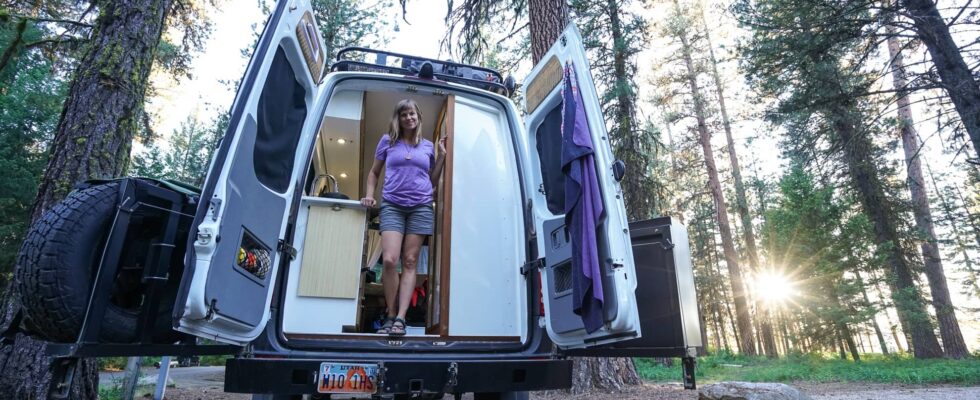In the exciting process of DIY camper conversions, it’s important to prioritize safety to ensure a secure and enjoyable camping experience. Whether you’re undertaking a camper ausbau as a recreational project or as a way to embrace a nomadic lifestyle, understanding safety considerations and legal requirements is essential. In this comprehensive guide, we will explore various aspects of camper safety, including structural integrity, electrical systems, gas installations, fire safety, weight limits, and legal regulations. By familiarizing yourself with these considerations and adhering to the necessary requirements, you can build a DIY camper that provides peace of mind and a safe haven on your adventures.
Structural Integrity: Building a Solid Foundation
The structural integrity of your DIY vehicle is paramount to ensure safety on the road, specially when it comes to camper ausbau. Consider the following aspects:
– Vehicle Selection: Choose a base vehicle that is suitable for your camper conversion. Ensure it has the appropriate weight-bearing capacity, towing capabilities (if applicable), and a robust chassis to support the added weight of the camper.
– Frame Reinforcement: If necessary, reinforce the frame of the vehicle to accommodate the additional weight and stresses of the camper structure. Consult with professionals or experienced builders to ensure the reinforcement is done correctly.
– Roof Load Capacity: Assess the roof load capacity of your vehicle and factor in the weight of any rooftop accessories or installations. Avoid exceeding the manufacturer’s specified limits to maintain stability and prevent damage.
Electrical Systems: Ensuring Safe Power Supply
Proper electrical systems in your DIY camper are crucial for powering appliances, lighting, and other equipment. Consider the following safety measures:
– Electrical Planning: Create a detailed electrical plan, considering the power requirements of your appliances and devices. Use appropriate wire gauges, fuses, and circuit breakers to prevent overloads and electrical hazards.
– Ground Fault Circuit Interrupters (GFCIs): Install GFCIs in areas where electrical outlets may be exposed to moisture, such as the kitchen or bathroom. GFCIs are designed to protect against electric shocks in the event of a ground fault.
– Proper Wiring Techniques: Follow safe wiring practices, including using appropriate connectors, securing wires properly, and avoiding sharp bends or pinching. Label circuits and connections for easy identification and troubleshooting.
Gas Installations: Handling Gas Safely
If your DIY camper includes gas-powered appliances, such as stoves, heaters, or refrigerators, it’s essential to handle gas installations with care. Consider the following precautions:
– Leak Detection: Perform regular leak tests on gas lines and connections to ensure there are no leaks. Use a gas leak detector solution or a soapy water mixture to identify any escaping gas.
– Ventilation: Provide adequate ventilation for gas-powered appliances to prevent the accumulation of gas fumes. Install vents, exhaust fans, or windows in appropriate areas to ensure proper air circulation.
– Gas Cylinder Storage: Properly secure gas cylinders to prevent movement or tipping during transit. Ensure they are stored in well-ventilated compartments and adhere to local regulations for gas cylinder storage.
Fire Safety: Protecting Against Fire Hazards
Fire safety is of utmost importance in a DIY camper. Take the following measures to reduce the risk of fires:
– Smoke Detectors: Install smoke detectors in appropriate locations throughout the camper. Test them regularly and replace batteries as needed.
– Fire Extinguishers: Keep a fire extinguisher easily accessible in your camper. Ensure it is the appropriate type for extinguishing common fires and learn how to use it effectively.
– Fire-Resistant Materials: Choose fire-resistant materials for furnishings, wall coverings, and insulation. This can help prevent the spread of fire and provide additional time for evacuation.
Legal Regulations: Complying with Camper Conversion Laws
Before embarking on your DIY camper conversion, familiarize yourself with the legal requirements and regulations specific to camper conversions in your region. Consider the following:
– Vehicle Registration and Insurance: Ensure that your converted camper meets the requirements for vehicle registration and insurance. Consult local authorities or vehicle registration offices to understand the necessary procedures and documentation.
– Building Codes and Standards: Familiarize yourself with any building codes or standards that may apply to camper conversions in your area. This includes structural requirements, electrical safety, and gas installations.
– Roadworthiness and Safety Inspections: Some jurisdictions require roadworthiness inspections or safety certifications for modified vehicles. Understand the inspection requirements and ensure your camper meets the necessary standards.
– Travel Restrictions: Be aware of any travel restrictions or limitations for campers, such as size restrictions, weight restrictions on certain roads, or parking regulations in specific areas. Plan your routes accordingly to avoid any legal complications.
Conclusion
Prioritizing safety considerations and adhering to legal requirements is paramount when undertaking a DIY camper conversion or vanausbau. From ensuring structural integrity and proper electrical systems to handling gas installations, fire safety, weight limits, and legal regulations, each aspect contributes to the overall safety and compliance of your camper.
By taking the time to plan, research, and implement safety measures, you can create a camper that provides a secure and enjoyable experience on your camping adventures. Remember to consult local authorities, professionals, or experienced builders when in doubt to ensure your DIY camper meets the necessary standards and regulations.


